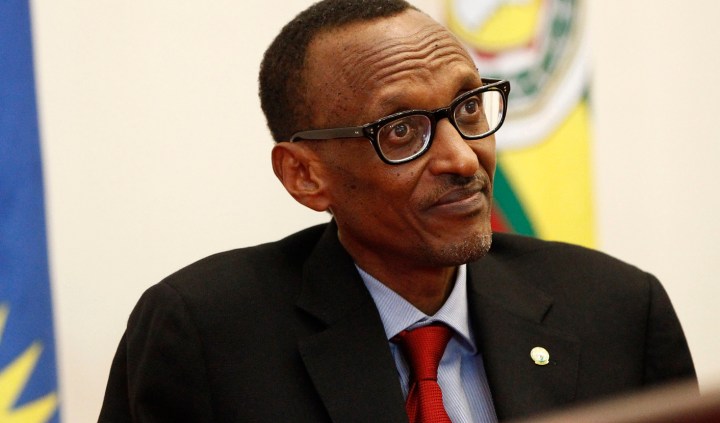Africa
Analysis: Murdered Rwandan spy chief Karegeya won’t be the last victim

If you’re surprised by the apparent assassination of an ex-Rwandan spy chief in a Sandton hotel room, you shouldn’t be. It makes perfect sense that Johannesburg is crawling with Rwandan dissidents, and – given what they’re running from – one of them was going to end up dead sooner or later. Nor should it shock that violence from central Africa is spilling over into South Africa, which has been meddling in the region for more than a decade. By SIMON ALLISON.
We know the basics. A dead body in a hotel room. A rope, and a bloody towel, in the safe. A shadowy Rwandan businessmen on the run.
This wasn’t just any hotel room. The Michelangelo in Sandton is already infamous for being the favourite hang-out of Africa’s recklessly rich (and was once bankrolled by Muammar Gaddafi, who himself wasn’t shy of the odd conspiracy, or two).
It wasn’t just any body, either. Lying on the floor, neck swollen and discoloured, was the corpse of Patrick Karegeya.
Like so many of Rwanda’s political elite, Karegeya had a chequered and morally ambiguous past. He was part of the invading guerrilla movement, led by current Rwandan President Paul Kagame, which marched in from Uganda to put a halt to the Rwandan Genocide in 1994. For more than a decade, he served Kagame loyally in the new government, becoming head of the country’s feared intelligence apparatus – in which capacity, he oversaw more than his fair share of dirty tricks against opponents of the regime. Then he fell out with Kagame, or had an attack of conscience, or did something that got him locked up in prison for 18 months.
In 2007, he landed up in South Africa, fleeing the country of his birth. He was on the run, scared of further persecution from a hostile state. He knew exactly what to be afraid of – after all, for many years he had been in charge of administering that persecution.
It’s no surprise he ended up here. For one thing, South Africa is always a favourite destination for refugees: in 2011, Home Affairs received 106,904 individual applications to be recognized as a refugee, more than any other country. South Africa has a track record of welcoming political exiles in particular: Haiti’s Jean-Bertrand Aristide made his home in Johannesburg after being ousted in a coup (he’s since returned to Haiti), as did former Madagascar President Marc Ravalomanana.
South Africa, and Johannesburg in particular, is also host to a large and thriving Rwandan community. Many are economic migrants, here for South Africa’s more sophisticated job market. Others are on the run: conscientious objectors to Kagame’s authoritarian regime, perhaps; former Kagame allies who have ended up on the wrong side of internal power struggles; and even, allegedly, perpetrators of the genocide who have found anonymity in South Africa. Despite their disparate motivations, these political exiles are all united by one thing: fear of retribution.
This fear is well grounded.
“Enemies of Kagame – the despot so beloved by Western democratic leaders and charity dupes – seem to have a strange habit of dying in disturbing circumstances,” observed Ian Birrell in the Independent. “Over the years a succession of prominent critics and campaigners, judges and journalists, have been killed. They have been beaten, beheaded, shot and stabbed, both at home in Rwanda and abroad in nervous exile. Some were good people, others far from saints – and their deaths came after crossing Kagame.” (South Africa’s had a taste of this already, with the twin attempts on the life of General Faustin Kayumba Nyamwasa in 2010. Nyamwasa, a close friend of Karegeya, is convinced that Kagame is behind the murder).
There’s another reason that South Africa makes a sensible choice for Kagame’s enemies. Although it’s easy to forget, among those enemies is the South African government itself – who has contributed troops and money this year to a United Nations effort to crush a rebellion in the eastern Democratic Republic of Congo. By all accounts – except those offered by the Rwandan government itself, which has made something of an art form of denial – the rebellion was supported and sustained by Rwanda, making the eastern DRC conflict something of a proxy war, with Rwanda on one side and a United Nations coalition drawn from Malawi, South Africa and Tanzania.
In fact, South Africa’s long involvement in the DRC has often been at odds with Rwanda’s even longer involvement there, making the relationship between the two countries tense in the extreme – and making South Africa a natural destination for Rwandan dissidents. The enemy of my enemy is my friend, after all.
It’s doubtful, however, that foreign policy-makers in Pretoria ever thought that the violence in Central Africa would spill over into Sandton – if, of course, that’s what happened. Although Kagame and his allies would seem to have the strongest motive to get rid of Karegeya, there’s no evidence that proves their involvement beyond the troubling pattern of assassinations and attempts against exiles and opponents. With his history, Karegeya could have made any number of other enemies.
Kagame’s regime remains, however, the most likely suspects. And with that regime’s track record, and South Africa’s undeniable appeal for Rwandan dissidents and exiles, Karegeya’s murder will not be the last such incident to happen within our borders. DM
Read more:
-
Rwandan Exiles Blame Kagame After Ex-Spy Chief Strangled on Bloomberg
-
Darling of the West, terror to his opponents: meet Rwanda’s new scourge on the Independent
-
While you were on holiday: a bloody New Year in Africa on Daily Maverick
Photo: Rwanda’s President Paul Kagame takes part in a joint news conference soon after a meeting with presidents Uhuru Kenyata of Kenya, and Yoweri Museveni of Uganda in Entebbe, 36km (22 miles) southwest of the capital Kampala, June 25, 2013. REUTERS/James Akena


















 Become an Insider
Become an Insider